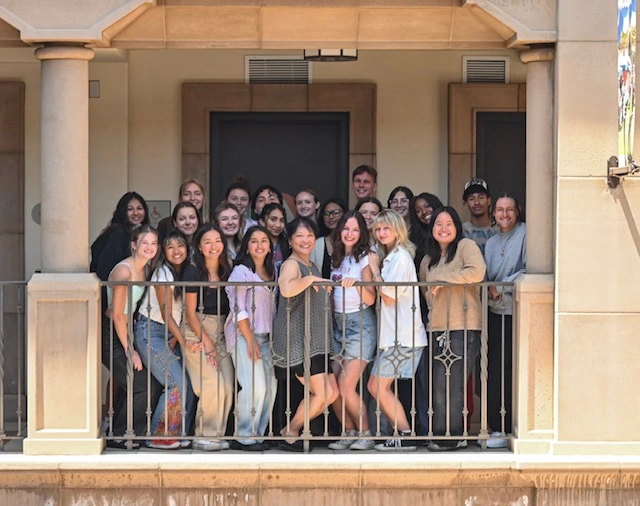Anjali Dalal-Whelan / News Editor
The most recent outbreak of war between Israel and Hamas has led to varied reactions and conflicts throughout the world. The topic has reached colleges, as students around the country have held vigils, protests and information sessions on the side of either Israel or Palestine.
On Oct. 7, Hamas, the militant group operating out of Palestine, launched a surprise attack on Israel. According to The Guardian, at least 1,300 people were killed in the attack while the Israel Defense Force says 199 people were taken as hostages, the majority being civilians. According to the New York Times, so far, Hamas has released four hostages.
After the Oct. 7 attack, Israel declared war on Hamas and began a siege on Gaza. On Oct. 13, Israel advised over one million residents of the Gaza Strip to evacuate, an order that the United Nations called “impossible” without “devastating humanitarian consequences.”
According to the Gaza Health Ministry as of Oct. 24, at least 5,791 Palestinians in Gaza have been killed by Israeli air strikes, 2,360 of them being children. According to a statement from President Joe Biden, on Oct. 21 the first humanitarian assistance reached Gaza since Hamas’ attack. 20 trucks with food, water and medical supplies were allowed into Gaza to provide aid.
Moroccan journalist and former USD professor of Middle Eastern politics Aboubakr Jamaï offered historical context on Hamas’ attack.
“I think we shouldn’t have been surprised in the sense that something’s got to give. That you cannot permanently keep people, human beings, under the conditions that the Palestinians were kept under. That at some point, something needs to give out,” Jamaï explained. “Everybody talks as if history doesn’t exist. 70% of the Gazan population, which is 1.4 million people, are refugees from 1948, which means that the land that is today called Israel was their home and they were expelled from it in 1948.”
Jamaï condemned the death of civilians on both sides.
“We should condemn the death of civilians, but we need to contextualize it,” Jamaï said.
Two days after the initial attack on Israel, USD President James T. Harris III released an email statement with the subject “Terrorism in Israel” sending prayers to Israel and calling for an end to violence. This statement received criticism from USD’s Palestinian Solidarity Committee (PSCUSD), who issued a statement on Instagram criticizing President Harris for not mentioning Palestinian lives and historical context in his statement.
PSCUSD is calling for President Harris to apologize for the letter and rewrite it.
As of Oct. 17, PSCUSD said they had not received a response from anyone in USD’s administration.
USD sophomore Ava Cumello is Jewish and visited Israel over this summer. She also commented on Harris’ statement.
“I think I knew they were gonna have to take a more neutral stance, just because it is such an inflammatory topic right now. But I do wish there was some type of condemning of Hamas. To not condemn that seems like kind of a bit of a hit to the Jewish students and people on campus.”
USD graduate student Alina Cheema was disappointed by President Harris’ statement for a different reason.
“As a Muslim, I have been a supporter of the Palestine movement for so many years. I felt very isolated and not safe in our school. I know that our school can’t come out and speak for Palestine, but at least I would have expected them to be neutral and considerate of all students,” she expressed. “Especially the [subject line] which was ‘Terrorism in Israel,’ it just felt so one-sided, and against us. The only word I can use to describe it is ‘ignorant.’”
Palestinian solidarity groups at many other universities have also issued statements. A statement from the Harvard Undergraduate Palestine Solidarity Committee which was co-signed by 33 other Harvard student organizations stated that they “hold the Israeli regime entirely responsible for all unfolding violence.” This statement received backlash from Harvard alumni and professors who called it anti-semetic.
According to the New York Times, Harvard students affiliated with the group were doxxed. Merriam-Webster defines “doxxing” as a form of harassment in which someone’s personal information is released. A truck with photos and names of students, and a banner reading, “Harvard’s Leading Anti-Semites’’ drove outside the Harvard campus.
Reports of anti-Semitic incidents in the U.S. have risen steadily over the past several years, according to the Southern Poverty Law Center. Recently, The Independent reported a photo of pro-Palestine protests in Times Square, where one person in the crowd held a photo of a swastika on his phone.
Palestinian solidarity protests have also taken place across most major cities and many college campuses.
Cumello reflected on her identity as a Jewish person seeing Palestinian solidarity protests after the Hamas attack.
“I do find it scary, because it seems like a lot of what’s going on, both on college campuses and pro Palestine rallies is less about fighting for better rights for the Palestinian people and more about anti-semitism,” Cumello said. “Like the people in Times Square holding up swastikas… I want to advocate for all innocent people. I think all innocent people deserve, obviously, the right to life, health and happiness. So I’m all for better rights for the Palestinians. Let’s make sure [nobody is] going to go out and kill Palestinians civilians, but it seems that there’s a lot of anti-semitism happening [too]. So it’s just been scary to see all that and seeing people so one sided on college campuses.”
USD Professor and Executive Director in the Kroc Institute for Peace and Justice Dr. Andrew Blum shared his perspective on students facing consequences for speaking.
“Universities are places where that type of [free] speech needs to be allowed and encouraged. I think people need to realize there are over 14 million undergraduate students in the U.S. With that many students, people will always be able to find something a student has said to criticize,” Blum said. “At the end of the day, those in power should worry more about the conflict in Israel-Palestine than policing what students in the U.S. are saying about the conflict in Israel-Palestine.”
On Oct. 17, USD’s Associate Student Government (ASG) released an email statement with the subject “Statement on Israel-Hamas.” The email called on students to educate themselves on the issue and acknowledged the complexity of the situation. The email also stated, “we express our deep sympathy and mourn for all those affected by the violence, especially those that are a part of our campus community. And we hope for a peaceful resolution that can pave the way for a more stable and prosperous future for all residents of the region.”
USD’s Palestinian Alliance of Law students (PALS) and Muslim Student Association (MSA) held an event called “Learning Palestine” on Tuesday, Oct. 17. The goal of the event was to educate students on the history of Palestine, as well as to hear perspectives from people who were presently in Gaza. Around 40 students in undergrad and graduate school attended the event.
USD Senior Hasan Iqbal attended the “Learning Palestine” event and explained his reason for being there.
“As someone who is not Palestinian, who is not a devout Muslim, who has been educated for nearly a decade about the occupation, I feel that it’s a moral obligation of mine to speak out against misinformation, and speak up, for those that cannot,” Iqbal said. “Too long has it been inflated that being against the state of Israel means you are anti-semetic, and that is not right.”
Iqbal mentioned a hate crime that occurred in Illinois last week, where a six-year-old Muslim boy was stabbed to death.
“In my mind, this child, Wadea, his blood is on our hands because our peers have been willingly spreading misinformation that leads to the justification of this kind of violence.”
On the social media app Fizz, an anonymous app which requires users to have a USD email to access and post, one anonymous user posted words which PSCUSD and USD PALS considered to be hate speech: “enough of letting these Hamas terrorists think they’re powerful and can instill fear. I say we flatten the Gaza strip into a f***ing parking lot.” PSCUSD and USD PALS issued a joint statement on Instagram in response to the anonymous post, condemning the Fizz post and demanding action from USD.
“We emphasize that such acts and rhetoric around the country and in our own campus have been emboldened by wide spread of false narratives, misinformation, and lack of acknowledgement and condemnation of the genocide occurring against Palesinians in Gaza, including inefficient statement from academic and other institutions around the country,” the joint statement said. The Fizz post has since been removed.
USD sophomore Lia Freehlign reflected on her stance as a Jewish student seeing the reactions to the war.
“For the most part, I feel pretty supported, especially with those around me. And even though there really is not a big Jewish population at USD, I do feel very safe on our campus.” Freehlign said. “Even just being around San Diego, I’m not fearful, I don’t really feel like I get a lot of negative energy from people around me.”
Although she hadn’t personally experienced it, Freehlign expressed that some Jewish people have feared for their safety, due to recent events.
“I’ve heard about so many attacks happening in other places in the world. I certainly don’t feel like I can’t express my own opinions and won’t be respected for them. But I’m certainly aware that there is a great sense of fear in the lives of Jewish people.”
According to the New York Times, some Jews in the U.S. have said they feel abandoned by the support Palestine has received in the past weeks.
“In the Hamas attacks, many saw an existential threat, evoking memories of the Holocaust and generations of antisemitism, and provoking anxiety about whether they could face attacks in the United States. And they were taken aback to discover that many of their ideological allies not only failed to perceive the same threats but also saw them as oppressors deserving of blame,” the New York Times reported.
While support for Palestine has been shown through social media and solidarity protests, President Joe Biden continues showing strong support to Israel. Biden recently concluded a trip to Israel where he expressed the U.S.’ support for the country. Israel and the U.S. are close allies. According to BBC, the U.S. provides Israel with $3.1 billion in defense aid a year. Last week Biden asked congress to approve an additional $14 billion in funding for Israel.
Colleges around the country including USD are participating in the discourse. While some students fear consequences of speaking out, others have been vocal, making this issue prominent at USD.
The information reported in this article has been updated as of The USD Vista’s production day, Oct. 24, 2023.




Leave a comment